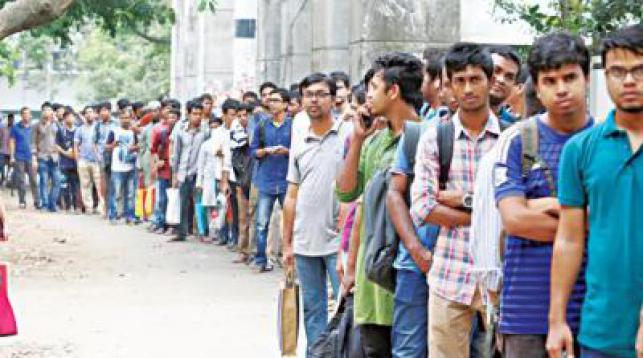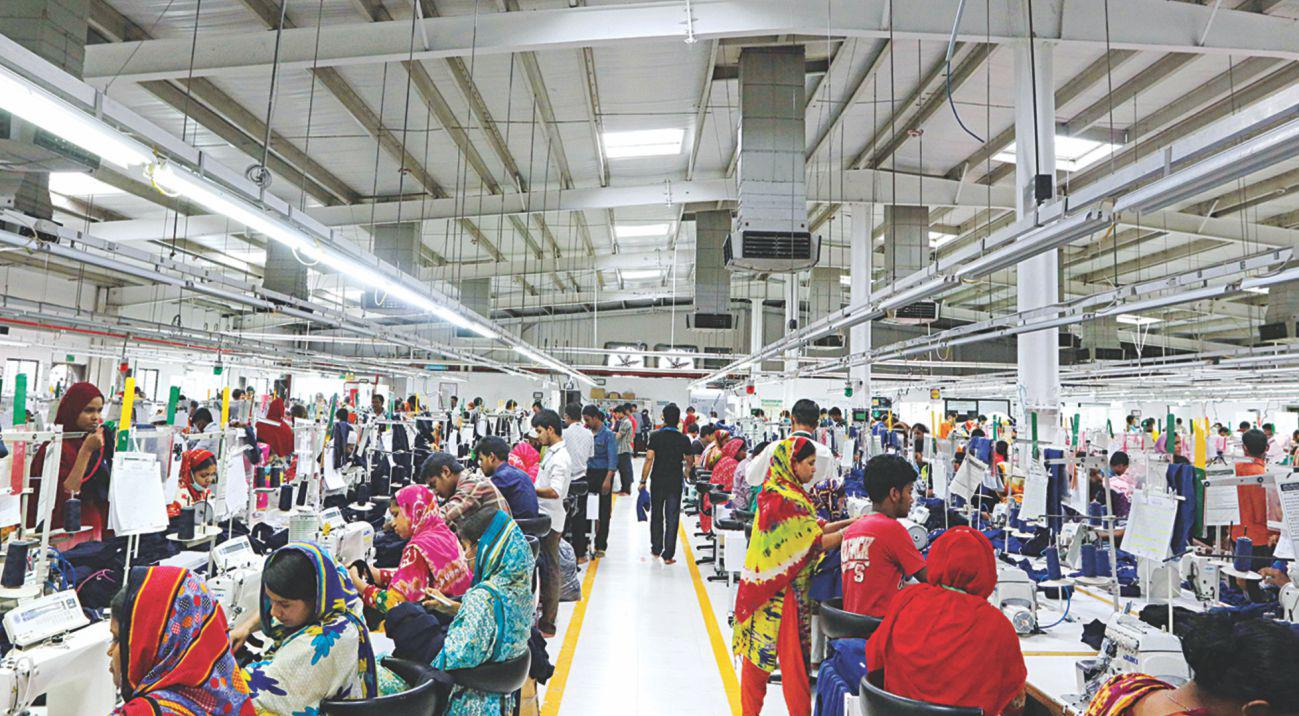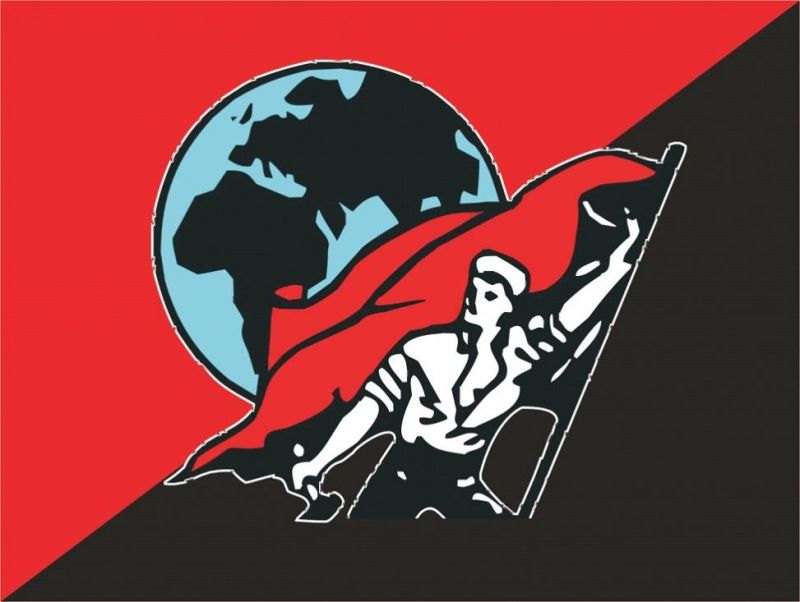
COVID-19: Approximately twenty millions people become jobless in Bangladesh
( Labour voice )
Employment is the main source of earning income and livelihood for most of the people of Bangladesh. Employment and poverty are closely related with each other. Poverty reduces with the augmentation in employment. Employment creates earning capacity and ensures workers entitlement on goods and services. but at the moment Covid-19 created a unexpected situation in Bangladesh.
Though the restriction of movement and general holidays are helping the nation contain the spread of deadly coronavirus, economists fear it will have a huge adverse impact on the livelihoods of millions of people engaged in informal sector as their 'wages are disappearing'.
They said around 20 million people, involved in informal sector, have already become temporarily jobless as a fallout of coronavirus, putting a serious stress on the economy.
Rickshaw-pullers, transport workers, day-labourers, street-vendors, hawkers, the employees of hotels, restaurants and different shops, markets, construction workers and other informal workers are the worst victims of the halt in economic activity as they have lost their means to earn bread and butter.
The economists appreciated the government's quick steps to provide food aids to the affected people, and said effective plans and strategies should also be worked out to help the jobless people return to their work once normalcy is restored.
According to the Labour Force Survey-2017, around 60.8 million people were in various employment or engaged in economic activity while the informal employment was dominating as 85.1 percent of the employed population engaged in the country's informal employment. The contribution of informal jobs to urban areas was 13.1 million while 38.6 million in rural areas.
Contacted, professor Mustafizur Rahman, distinguished fellow at the Centre for Policy Dialogue (CPD), said business and employment are confronting the adverse impact of the shutdown of the economic activities. "A large portion of our labour force involved in service sector who do not get monthly salary are badly affected by the coronavirus shutdown," he observed.
Of the total 60.8 million people employed in various ways both in formal and informal sectors, Mustafiz said 14 million people get monthly salary from their employers while over a 10 million are day-labourers wo get daily wages based on their work.
Besides, he said, 27 million people are self-employed like hawkers, street vendors, and small businessmen like grocery and other shop owners.
"An overwhelming majority of the country's 37 million labour forces--self-employed ones and day labourers--have become temporarily jobless and they've no earning," Mustafiz said.
The noted economist said this big number of people will remain jobless until the economic activities resume and things come into order.
He said around 50,000 people go abroad from Bangladesh for jobs every month. "But new migrant workers couldn't go abroad in the last two months. Perhaps, they won't be able to go in the next few months, too. Besides, the migrant workers who already returned home in the face of coronavirus impact may add to the growing unemployment rolls."
Under the circumstances, the economist said, social safety net must be widened further with adequate allocation while OMS activities in cities should be strengthened to mitigate the sufferings of the unemployed people.
The government should also make proper action plans so that the affected people in the informal sector can resume business and the jobless people can engage in economic activity once the situation gets normal.
Shamsul Alam, senior secretary and member of the General Economics Division (GED) of the Bangladesh Planning Commission, said the unemployment rate in country is fueling, and it will take a serious turn in the future due to the coronavirus impact.
"Some 85 per cent workforce is involved in informal sector which is hit hard by the coronavirus shutdown. People working in this sector are losing their incomes for lack of economic activities," he observed.
Executive director of the Policy Research Institute of Bangladesh (PRI) Ahsan H Mansur said officially there are around 4 per cent unemployment in the country, but it is not the real figure.
"The unemployment situation will be awful in the near future in the country. Around 2.5 million people are involved only in the services sector like hotels, restaurants and resorts. Around 70-80 lakh people are involved in small and medium-sized enterprises (SME) sector while there are around 4.5 million workers in the RGM sector. Many of the workforces have already become temporarily jobless while many others are at the risk of losing jobs due to the coronavirus shutdown," he added.
Ahsan said the employment of RMG workers depend on foreign buyers. "But now foreign buyers are cancelling their orders one after another. So, employment in the RMG sector is now at risk."
According to Bangladesh Garment Manufacturers and Exporters Association (BGMEA) data released on 31 March 1048 factories reported 907.14 million pcs worth $2.87 billion export cancelled/ held up.
"There's a chance that many SME workers will be laid off if the government doesn't financially support the entrepreneurs and the public holidays are extended further," the PRI executive director said.

About 30% employees in the tourism sector will be out of jobs due to the coronavirus.
Mentioning this at a press conference at the National Press Club in Dhaka on Monday, Tour Operators Association of Bangladesh (TOAB) demanded relaxation of unnecessary restrictions at airports and ports.
Earlier on Sunday, Foreign Minister Dr AK Abdul Momen said Bangladesh has decided to impose a ban on travellers from all European countries except the UK till March 31, beginning Sunday midnight, after detecting two new coronavirus positive cases on Saturday.
Citing the World Health Organization’s declaration of Europe as the new centre point of coronavirus spread, he said the government had to take this difficult step to protect its citizens from the outbreak.
Over 6,500 people have died worldwide due to coronavirus, with more than 170,000 infected as of Monday, according to worldometers.

Overseas job seekers
As the spread of coronavirus across the world continues, its effect on overseas migration from Bangladesh is felt for the first time with Kuwait slapping a temporary travel ban on Bangladeshis and other six nationalities.
About 7,000 Bangladeshi workers who were about to complete the migration process and who returned home on leave are met with uncertainty following a ban on their entry into Kuwait, said recruiting agencies.
They told New Age that any upcoming embargo on hiring workers from Bangladesh put the overseas employment sector at high risk as the disease spreads with human contact.
Recruiting Agencies Okya Parisad president M Tipu Sultan told New Age that several thousands of Bangladeshi workers with valid visas would not be able to enter Kuwait and China.
He said that there were about 2,000 Bangladeshi workers who were unable to fly to China, the epicentre of the novel coronavirus with their valid visas due to the coronavirus pandemic.
In a circular on Friday, Kuwait government said that all arrivals in the state of Kuwait of the citizens from Bangladesh, Philippines, India, Sri Lanka , Syria, Lebanon and Egypt, who have valid residency or previous entry visa , as well as those from other airports, during the past two weeks were prohibited.
Bangladeshi worker Md Rashed, who came to visit Bangladesh on a 20-day leave was in fear of not being able to return to Kuwait due to restriction on port entry.
‘I am worried about my return to Kuwait as my flight on Qatari airline is scheduled for March 10,’ he said.
Dhaka-based government officials and recruiting agents said that in the worst case scenario, if the Middle East got infected, some of the major destinations of Bangladeshi workers would close down.
Workers and rights activists said that Bangladeshi workers in some coronavirus-affected countries had reportedly been gripped by panic and were desperately trying to come back home.
Bureau of Manpower, Employment and Training director general Shamsul Alam told New Age on Saturday that workers were going abroad with job visas as usual as there was no impact of coronavirus on them.
‘But I cannot predict what will happen in the coming days if the coronavirus affect the destination countries,’ he said.
About Kuwait, he said that the Kuwait authorities tightened the movement of foreign workers but was yet to stop recruitment from Bangladesh.
Kuwait, on Tuesday, made medical certificates for the nationals from 10 countries, including Bangladeshis, mandatory. But the state withdrew the restriction on Thursday following requests by the countries concerned.
Bangladesh Association of International Recruiting Agencies secretary general Shameem Ahmed Chowdhury Noman said that Kuwait government decided to allow entry of migrant workers but the workers would be quarantined after reaching Kuwait.
Depending on the intensity of the spread of coronavirus, overseas jobs of workers will see a decline, he told New Age.
So far, Bangladeshi citizens have been infected with the virus in Singapore, the UAE and Italy. As a result, a significant number of Bangladeshis, working in countries like Singapore, Hong Kong, the UAE, Bahrain, Italy and Japan, are also struggling amid the ongoing outbreak.
The virus has already been detected in different Middle Eastern countries including Kuwait, the United Arab Emirates and Bahrain.
Saudi Arabia restricted travel and Umrah visa to avoid movements of foreign nationals there.
Ovibashi Karmi Unnayan Programme chairman Shakirul Islam told New Age that Bangladeshi workers in Singapore, Malaysia, Hong Kong and Bahrain were worried over coronavirus infection.
He suggested that Bangladesh missions and embassies abroad should keep the migrant workers updated about coronavirus through providing online briefing to them with necessary advices.
The World Health Organization called the spread of the Coronavirus ‘deeply concerning’ as a wave of countries reported their first cases of the disease which has now killed nearly 3,500 people and infected more than 100,000 across 92 nations.
Bangladeshi national based in Venice of Italy Sharmin Alamgir told New Age that they were following government instructions on coronavirus and maintaining protective measures while going out of the residences.
The death toll from the new coronavirus in Italy has risen to 197 after the largest daily increase in fatalities there since the outbreak began.
Quoting officials, the BBC reported that 49 people had died in 24 hours, while more than 4,600 cases have been reported in total.

Bangladesh Garment Workers Face Ruin
The empty, echoing shopping malls of Western cities are a testament to the biggest crisis borne by global clothing and retailindustries in over a generation. But the impact of the coronavirus on retail is a two-part devastation, as the daily flow of thousands of orders placed by Western retailers to supplier factories in South Asia has suddenly slammed to a halt.
Factory owners face financial ruin, while the livelihoods of hundreds of thousands of garment workers hang in the balance.
“Our situation is apocalyptic,” said Rubana Huq, president of the Bangladesh Garment Manufacturers and Exporters Association (BGMEA), which represents Bangladeshi factory owners. “The cancellations and hold instructions coming in from Western fashion retailers are pushing us to the point of insolvency, with massive open capacity and raw materials liabilities.”
Fast fashion retailers rarely own the factories that supply them with their wares. Instead, the vast majority of garment and footwear orders are outsourced to suppliers in emerging marketslike Bangladesh, where overhead is cheap and the cost of human labor is cheaper.
The majority of suppliers are in countries that can be the most vulnerable to large global economic shocks, such as India, Myanmar, Cambodia and Bangladesh, which is the second largest garment exporter nation after China.
Bangladesh, in particular, which has been the site of one of the most effective campaigns of the globalized erato improve labor and safety conditions for garment workers, has seen more than $2.8 billion worth of orders canceled or postponed since the start of the coronavirus crisis, according to Ms. Huq.
Ready-made garments comprised 84 percent of Bangladesh’s total exports, worth $40.5 billion, in its 2019 fiscal year, according to data posted on the website of the BGMEA. This loss compromises the ongoing employment of more than two million Bangladeshi garment workers.
“The situation is very bad. The Bangladeshi supply chain is in complete disarray with many foreign brands acting irresponsibly,” said Sharif Zahir, the managing director of the Ananta Group, which owns seven factories with a total of 26,000 workers. His company supplies brands that include H&M, Zara, Gap, Levi’s and Marks & Spencer.
According to Mr. Zahir, most Bangladeshi factories had already faced losses or thin margins since last year because of government-implemented wage increases in December 2018. Now, many buyers were canceling orders that had been produced, delaying payments and asking for discounts on already shipped goods.
“We have been left with around 20 percent of our orders for April. Beyond that, everything is uncertain,” Mr. Zahir said.
On March 26, the country deployed soldiers and police to enforce the start of a nationwide 10-day shutdown to slow the spread of the coronavirus. The densely populated country of 160 million people is deemed to be at a high risk of increased infections because hundreds of thousands of overseas Bangladeshi workers had returned home in recent weeks, often traveling from virus-affected nations to cramped and closely confined living conditions with little sanitation.
In an indication of the importance of the garment sector, which provides 80 percent of the country’s export earnings, retail factories are currently an essential industry, though the majority are currently closed.
“Factories are likely to empty of orders from April onward and are not in a position to pay salaries to workers. We understand it is a difficult time for buyers but they must understand that garment manufacturers are currently the weakest link,” said Mr. Zahir. “Workers are the responsibility of brands as well. They have better access to liquidity and governments offering much bigger rescue packages.”
A survey of factory owners in Bangladesh by Pennsylvania State University’s Center for Global Workers’ Rights found that millions of workers, mostly women from rural areas, had already been sent home without owed wages or severance pay. According to the survey, nearly all Western buyers refused to contribute to worker wages, and 70 percent of furloughed workers had been sent home without pay.
Big-name retailers have been at pains to stress that the cuts hit all areas of their businesses. After weeks of pressure, H&M said, on March 30, that it would take and pay for the shipments of goods that had already been manufactured for the company, as well as those currently in production. It said it would not negotiate prices on orders that had already been placed.
But the Swedish retailer has also warned that it will have to cut jobs; the pandemic has closed more than two-thirds of its 5,000 shops worldwide and has threatened landlords with the possibility of leaving leases early if sales don’t start to recover.
“We are doing everything in our power in the H&M group to manage the situation related to the coronavirus,” said H&M’s chief executive Helena Helmersson. “My hope is that we will be able to get operations up and running again as soon as possible.”
On March 31, Inditex, which owns Zara among other retailers and has temporarily closed nearly 4,000 of its stores, said it too would pay suppliers for orders that had already been produced. PVH, which owns Calvin Klein and Tommy Hilfiger, and the British high street retailer Marks & Spencer have also followed suit.
The vast majority of brands, however, are a long way from similar commitments. Primark, one of the largest purchasers of garments in Bangladesh, does not sell online. All 376 Primark stores in twelve countries are now closed until further notice, which represents a loss of some $807 million of net sales per month, the company said. It has frozen all future orders.
“The current situation has been so fast moving. We could not have foreseen that over the course of 12 days, our stores in every country in which we operate have had to close,” said Paul Marchant, the chief executive of Primark, last week.
“We have large quantities of existing stock in our stores, our depots and in transit, that is paid for and if we do not take this action now we will be taking delivery of stock that we simply cannot sell,” Mr. Marchant continued. “We recognize and are deeply saddened that this will clearly have an effect throughout our entire supply chain. This is unprecedented action for unprecedented and frankly unimaginable times.”
Although there are now signs from China that some fashion production lines are slowly starting to resume manufacturing, few industry observers are expecting things to get any easier for retailers.
“Though retailers are striving to entice spending with discounting and promotions, or with loungewear at the forefront of marketing campaigns, we expect these to have little impact at present as consumers acclimatize to new daily routines,” said Kate Ormrod, the lead retail analyst at the market research company GlobalData. “Significant fallout across the fashion sector is expected this year as fundamentally weaker players fail to recover once demand finally picks up.”
In a bid to offset some of the Western retail fallout, Bangladesh’s prime minister Sheikh Hasina announced a 5,000 crore Bangladeshi taka bailout worth $590 million on March 25. Many members of the Bangladeshi government are factory owners, but the funds, Prime Minister Hasina said, would be used solely as salaries and allowances for workers.
The challenge now facing the country is not only to ensure that the bailout gets to the right place, but that safety standards do not slip as factory owners find themselves in an increasingly desperate situation.
“It is essential for the government to engage in social dialogue with employers’ organizations and trade unions to come up with practical solutions which will keep people safe and protect jobs,” said Tuomo Poutiainen, country director for Bangladesh at the International Labor Organization.
“Proven social protection measures like supporting job and income security, preventing poverty and unemployment, and strengthening economic and social stability and peace is critical,” he said.
Koen Oosterom, the manager for Bangladesh and Myanmar for Fair Wear, a membership organization paid for by brands to improve working conditions, said that the fashion business faced an “extremely grim and unprecedented” situation, far worse in terms of potential ramifications than the financial crisis of 2008.
“There have been many tough conversations as of late about the sustainability of the industry. This situation is underscoring how unsustainable many of its practices really are,” he said. “Many in precarious work have lost their income and in some areas, people have never been more exposed to exploitation.”
As some fashion retailers fight to stave off bankruptcy in the next few months, there is concern that recent ethical and environmental improvements in manufacturing will not be maintained. “Events are playing out in countries where there is very little in terms of social security and labor laws are not always upheld,” Mr. Oosterom said.
And as for the overtures by Western brands and retailers in recent weeks to making masks and hospital gowns for front line medical workers, Ms. Huq said that the change would offer little reassurance or practical solutions for the army of garment workers in lockdown.
“We would need substantial support to change toward those sorts of product lines. The raw materials would have to be sourced and certified, it is stepping toward a totally new type of supply chain,” Ms. Huq said.
“For them, it’s a question of the survival of the businesses,” she said, of Western retailers. “For us, it’s the survival of our 4.1 million workers.”

final words:
There is no substitute for establishing a new society and an independent socialist society by eliminating the prevailing social system to prevent epidemics, protect the health of the common people, unemployment, poverty, eliminating social unrest.
To end the plunder of capitalism, the state aparatus , international imperialism, we have to build a society where there is no human dominance over human beings. People will not exploited by people. They will manage themselves. No-state, no-capitalist only socialist self-sufficient social system. All production systems will be owned by people of the society, including mill factories and agricultural farms. There will be no volatility of personal ownership. The word “employment” or “JOB” will be disappear forever from the society. People will be completely free.
Long Live - AnarchoSyndicalism !

